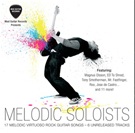The Importance of Having a Repertoire
 Over the years, I have met many guitar students who could not actually play anything, even though they had taken lessons, perhaps for years. If they were asked to play something, the best they could do would be offer you some isolated “pieces” of songs or solos they had worked on. They are missing certain pieces of knowledge about the Art & Science of practicing that would
Over the years, I have met many guitar students who could not actually play anything, even though they had taken lessons, perhaps for years. If they were asked to play something, the best they could do would be offer you some isolated “pieces” of songs or solos they had worked on. They are missing certain pieces of knowledge about the Art & Science of practicing that would
enable them to get past a hurdle that stops the progress of many guitar students: how to actually finish something you are learning, and bring it up to what is called “performance level”, which is another way of saying “I can get through this without it falling apart so badly I can’t keep it going”, or “I play it all the way through well enough to not cause me major embarrassment, or the listener major discomfort, or pain”.
Do you have a repertoire? (pronounced rep-eh-twah)
Answer these questions:
-Do you have a group of songs or pieces that you feel comfortable with, feel confident with, and that you enjoy playing?
-If someone asks you to play something, do you have things you can sit down (or stand up) and play?
-Do you have a group of songs or pieces that you can play all the way through, not just “pieces of”?
-Have you tested and refined your repertoire by playing in front of people?
Here is a letter I recently received, expressing this problem from someone who made the wise decision to educate themselves out of this situation.
Jamie,
“Your book arrived today. I am really hoping that your book can help me. I’m getting tired of “trying” to play. I want to be able to play for myself and others, i.e., have a repertoire of at least 10 songs under my fingers that I can play without embarrassing myself. At the moment I can’t seem to struggle through a simple song, Devil’s Dream, without fumbling even though I know, or at least think I know, it. I have been looking for the correct way to practice for some time. When I saw your article at Wholenote.com and the name of your book, I had to check it out. I’ll let you know what happens.” – Steve
This letter was good timing, since I had just decided to write about this very important subject of why you need a repertoire, and how to develop and maintain one.
There are many reasons why having a repertoire is vital to developing properly as a guitarist, and I will go through them. But first, let me tell you that the reason many “players” don’t have a repertoire is: #1) Nobody told them how important it is, and #2) Nobody told them how to GET one, #3) it is EASIER to leave things half finished, in pieces, than to put it together. In fact, putting something together, in tempo, and bringing it up to performance level, is often the hardest part of the whole process of learning a piece.
Play For Yourself First…
Some people always practice, and never play. Others always play, and never practice. Each is bad, but the first is worse. One day, in the early part of my development, I happened to just grab the guitar, and start playing this piece I was working on in lessons. I realized then, as I started to notice how much I enjoyed playing this little Baroque Sarabande, that I rarely allowed myself this pleasure of “playing”, I was too busy “practicing”. It is times like this that I say to myself, “Jamey, you are an idiot. Now, stop being like that!”.
And I did! I began to sit every night, after practicing all day, light a candle, and just PLAY. No obsessing about mistakes, or self flagellation about how well I “should” be playing this piece; just playing, and enjoying.
For me, that was the beginning of developing a repertoire; responding to the simple need of feeding myself emotionally by playing music. I was getting back to the original point of it all, the thing that made me pick up the guitar in the first place, before I complicated the whole issue with “my concerns”.
…Then Play for Others
As time went on, I realized that if I didn’t start performing, offering and sharing the results of my “work” with others, I would not get any better. I was starting to feel my motivation for practicing getting weaker, and I knew it had something to do with not having a REASON enough for practicing. Playing for myself the rest of my life was only going to take me so far. I realized that if I did not learn HOW to give a finished form to the many things I was practicing every day, (a finished form that would hold together in front of others) I would simply not break through to the next level as a player.
So I realized that, like it or not, I had to start performing (and there were many parts of it I didn’t like). I had to accept the fact that it would be a shaky start, I would often play with mistakes and various imperfections, but if I did not subject myself to this, I would not learn how to make it all better. So at first, I started to “create” performance situations” for myself.
I started grabbing family members, and made them sit down and listen to me play a piece or two, just so I could experience the pressure and nerves, and see where I would fall apart, so I could focus on that spot in the next day’s practice. Then, I started planning a piece to perform for my teacher at the beginning of every lesson. He didn’t ask me to do that, I just would go in and say “before we start, just let me play this piece for you”. After every lesson, I would plan the piece I would play next.
As I continued to do this, I got better and better. By setting these informal “performance goals” for myself, I began to see that my practicing was taking on more “structure” and organization, I now had more of a reason for practicing. The payoff of course, was the satisfaction of having achieved the ability to play something for someone else, and receiving their gratitude (applause). For those of you suffering from “lack of motivation” to practice, let me tell you that there is nothing like that experience for acting as an instant shot of “motivation medicine”! As Beethoven said after playing for a group of people who were too moved emotionally to applaud “what’s the matter with you people, a performer wants APPLAUSE!”
From there I went to giving public concerts, and the fun of seeing my picture in the paper!
How to Get a Repertoire: Write it Down!
I’I have often written of the need for developing your Power of Intention, the ability to feel a desire consciously, and put your actions behind it to bring it to reality in your life. One of the important tools for doing this is to WRITE YOUR GOALS DOWN, AND LOOK AT THEM OFTEN (many people write them down in a fit of resolve one day, and avoid looking at them later, because it is too depressing to face how they are avoiding working toward them!)
Putting your desires in writing helps to marshal the inner resolve to put forth the effort to accomplish them. As you begin to discover your own power for doing what you say (have written down) you will do, it gets easier, and in fact, becomes fun.As a first step, write down 3 songs or pieces that you like, and that you feel are within your present level of playing ability. It doesn’t matter what they are, it is just important to start somewhere, and it will develop from there.
After practicing them each day, record them, (use a cheap little hand held cassette player). Listen back, don’t wince at the mistakes, but resolve to practice those parts the next day as correctly as you know how!
You will see these pieces or songs getting better and better.
When you are getting through things reasonably well, plan on who your first victim will be, the first person you will try playing your developing repertoire for. I usually try to pick someone who really likes me!
Record that too. Later as you listen back, you can have the reassurance of knowing you are now hearing yourself at your worst. It won’t get any worse than that! You will have undoubtedly fallen under the power of Murphy’s Law, which was invented specifically for performing musicians: everything that could possibly go wrong, will have gone wrong!
Now that you have hit bottom, and faced your worst fears, there is no where to go but up! You will take that tape, and little by little, every day, you will improve it. In a month, you will have significantly raised your level as a guitar player, in fact, you may begin for the first time to feel like a guitar player, instead of a guitar student!
The next time you “perform” those pieces, they will be better, and the next time and the next time. As time goes by, you will have a SOLID repertoire.
Personally, I have things I can pull out and depend on no matter how many beers I have had, or how tired I am. That’s because these pieces have been tested, refined, and tested again over the years. All long time players develop these “trusted friends”. Ask yourself how you measure up when it comes to having a repertoire (I’ll bet you already have). Try out the ideas presented here, and you will have increased power to realize your goals as a guitar player.
click here for other players reactions to this essay!
Free! 10 Things You Can Do Right Now to Become a Better
Guitarist! “The Principles of Correct Practice for Guitar,” the Perfect
Start for Beginners, the Answer to the Problems of Players. Start to play the
guitar without getting bad habits, or get rid of the bad habits you already
have, by knowing how to do “perfect practice” with the Principles of Correct
Practice for Guitar.Visit:
www.guitarprinciples.com
Copyright © 2000 by Jamie Andreas, Guitarprinciples.com.










